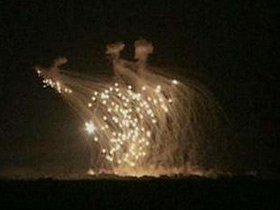 |
 |
 |
 Editorials | November 2005 Editorials | November 2005  
Shake and Bake
 NYTimes NYTimes


| | A file video grab shows U.S. military firing white-phosphorus munitions against insurgents in the Iraqi city of Falluja, November 9, 2004. The Pentagon acknowledged using incendiary white-phosphorus munitions in a 2004 offensive in Falluja and defended their use as legal, amid concerns by arms control advocates. (Reuters TV) |
Let us pause and count the ways the conduct of the war in Iraq has damaged America's image and needlessly endangered the lives of those in the military. First, multilateralism was tossed aside. Then the post-invasion fiasco muddied the reputation of military planners and caused unnecessary casualties. The W.M.D. myth undermined the credibility of United States intelligence and President Bush himself, and the abuse of prisoners stole America's moral high ground.

Now the use of a ghastly weapon called white phosphorus has raised questions about how careful the military has been in avoiding civilian casualties. It has also further tarnished America's credibility on international treaties and the rules of warfare.

White phosphorus, which dates to World War II, should have been banned generations ago. Packed into an artillery shell, it explodes over a battlefield in a white glare that can illuminate an enemy's positions. It also rains balls of flaming chemicals, which cling to anything they touch and burn until their oxygen supply is cut off. They can burn for hours inside a human body.

The United States restricted the use of incendiaries like white phosphorus after Vietnam, and in 1983, an international convention banned its use against civilians. In fact, one of the many crimes ascribed to Saddam Hussein was dropping white phosphorus on Kurdish rebels and civilians in 1991.

But white phosphorus has made an ugly comeback. Italian television reported that American forces used it in Falluja last year against insurgents. At first, the Pentagon said the chemical had been used only to illuminate the battlefield, but had to backpedal when it turned out that one of the Army's own publications talked about using white phosphorus against insurgent positions, a practice well known enough to have one of those unsettling military nicknames: "shake and bake."

The Pentagon says white phosphorus was never aimed at civilians, but there are lingering reports of civilian victims. The military can't say whether the reports are true and does not intend to investigate them, a decision we find difficult to comprehend. Pentagon spokesmen say the Army took "extraordinary measures" to reduce civilian casualties, but they cannot say what those measures were.

They also say that using white phosphorus against military targets is legal. That's true, but the 1983 convention bans its use against "civilians or civilian objects," which would make white phosphorus attacks in urban settings like Falluja highly inappropriate at best. The United States signed that convention, but the portion dealing with incendiary weapons has been awaiting ratification in the Senate.

These are technicalities, in any case. Iraq, where winning over wary civilians is as critical as defeating armed insurgents, is no place to be using a weapon like this. More broadly, American demands for counterproliferation efforts and international arms control ring a bit hollow when the United States refuses to give up white phosphorus, not to mention cluster bombs and land mines.

The United States should be leading the world, not dragging its feet, when it comes to this sort of issue - because it's right and because all of us, including Americans, are safer in a world in which certain forms of conduct are regarded as too inhumane even for war. That is why torture should be banned in American prisons. And it is why the United States should stop using white phosphorus. | 
 | |
 |



